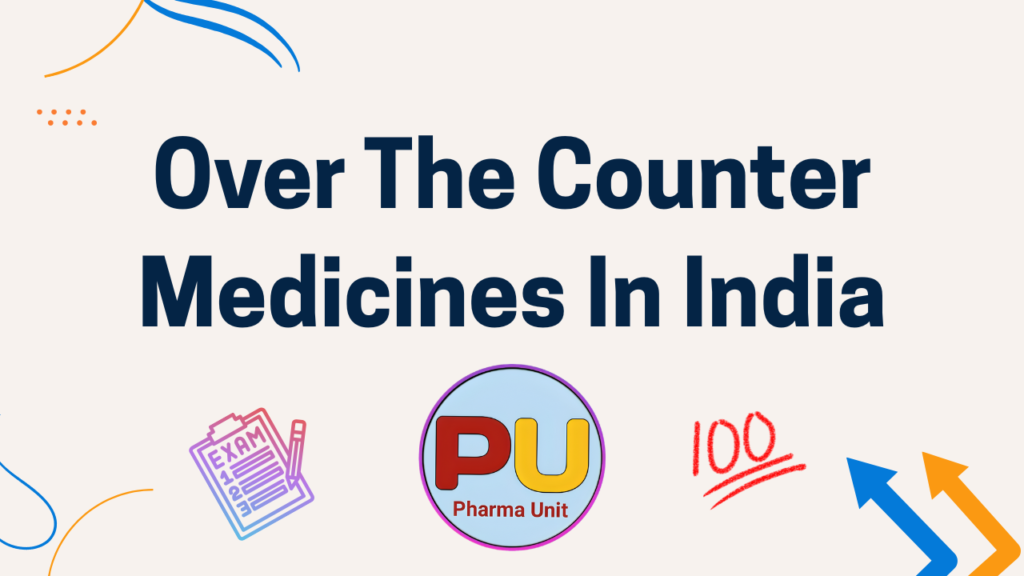Have you ever walked into a pharmacy, bought a painkiller or cough syrup, and left without showing a prescription? If yes, then you have already used an OTC medicine.
OTC stands for Over the Counter medicines. These are drugs that can be purchased directly from a pharmacy or medical store without a doctor’s prescription. Because of their easy availability, OTC medicines are widely used for common, day-to-day health problems.
However, easy availability does not mean they are risk-free. For pharmacy students, understanding OTC medicines is important not only for exams but also for safe dispensing and patient counselling.

What Are OTC Medicines?
Over-the-counter medicines are drugs that are considered safe and effective for self-use when taken as directed on the label. They are approved by regulatory authorities such as the CDSCO in India and are meant for short-term use in minor illnesses.
Common examples include:
a) Paracetamol and ibuprofen for pain and fever
b) Cold and cough preparations
c) Antacids for acidity and heartburn
d) Laxatives for constipation
e) Antihistamines like cetirizine for allergies
These drugs do not require a prescription, but they still require professional judgment, especially when patients have chronic diseases or are taking other medicines.
Why Are OTC Medicines So Commonly Used?
OTC medicines are popular because they offer a practical solution for minor health issues.
a) Convenience: No need for a doctor visit for simple problems like headache or cold
b) Affordability: Generally cheaper than prescription medicines
c) Accessibility: Easily available in pharmacies and online platforms
From a pharmacy perspective, OTC medicines reduce unnecessary burden on healthcare facilities, but only when used responsibly.
Are OTC Medicines Completely Safe?
This is where most people go wrong.
OTC medicines are safe when used correctly, but misuse, overuse, or incorrect combination can cause serious harm.
For example, paracetamol is safe at therapeutic doses, but overdose can lead to acute liver failure. Many cold and flu preparations already contain paracetamol. When patients take multiple OTC products together without reading labels, accidental overdose becomes common.
This is why pharmacists play a critical role in guiding patients, even for non-prescription medicines.
Common Types of OTC Medicines and Their Uses
1. Pain Relievers: Examples: Paracetamol, Ibuprofen, Aspirin
Used for: Headache, fever, muscle pain, joint pain
Caution: NSAIDs like ibuprofen can cause gastric irritation and should be taken with food. Avoid in patients with ulcers or renal disease.
2. Cold and Allergy Medicines: Examples: Cetirizine, Loratadine, Phenylephrine
Used for: Sneezing, runny nose, nasal congestion
Caution: Some antihistamines cause drowsiness. Decongestants should be avoided in patients with hypertension.
3. Digestive System Medicines: Examples: Antacids, anti-diarrheals, laxatives
Used for: Acidity, diarrhea, constipation
Caution: Prolonged laxative use can cause dependence and electrolyte imbalance.
4. Topical Preparations: Examples: Antifungal creams, mild steroid creams, burn ointments
Used for: Skin infections, rashes, insect bites
Caution: Unsupervised steroid use can worsen fungal infections and thin the skin.
Guidelines for Safe Use of OTC Medicines
Responsible use of OTC medicines is essential. Pharmacy students should always emphasize the following points to patients:
a) Read the label carefully before using any medicine
b) Do not combine multiple OTC drugs without checking active ingredients
c) Follow the recommended dose and duration strictly
d) Watch for side effects such as rashes, dizziness, or stomach pain
e) Store medicines properly and keep them out of reach of children
OTC medicines are meant for short-term symptom relief, not long-term treatment.
When Should a Patient Be Referred to a Doctor?
Self-medication should stop and medical advice should be sought if:
a) Symptoms persist beyond 3–5 days
b) Symptoms worsen despite medication
c) There is high fever, bleeding, or breathing difficulty
d) The patient is pregnant, elderly, or has chronic illness
Knowing when not to dispense OTC medicines is just as important as knowing when to dispense them.
Read about Patient counselling.
